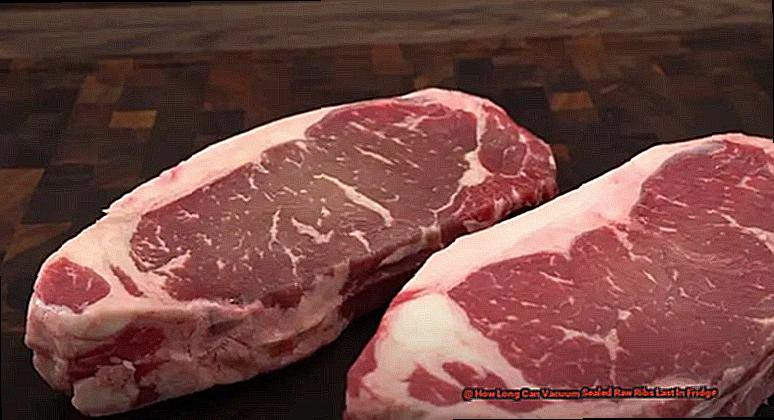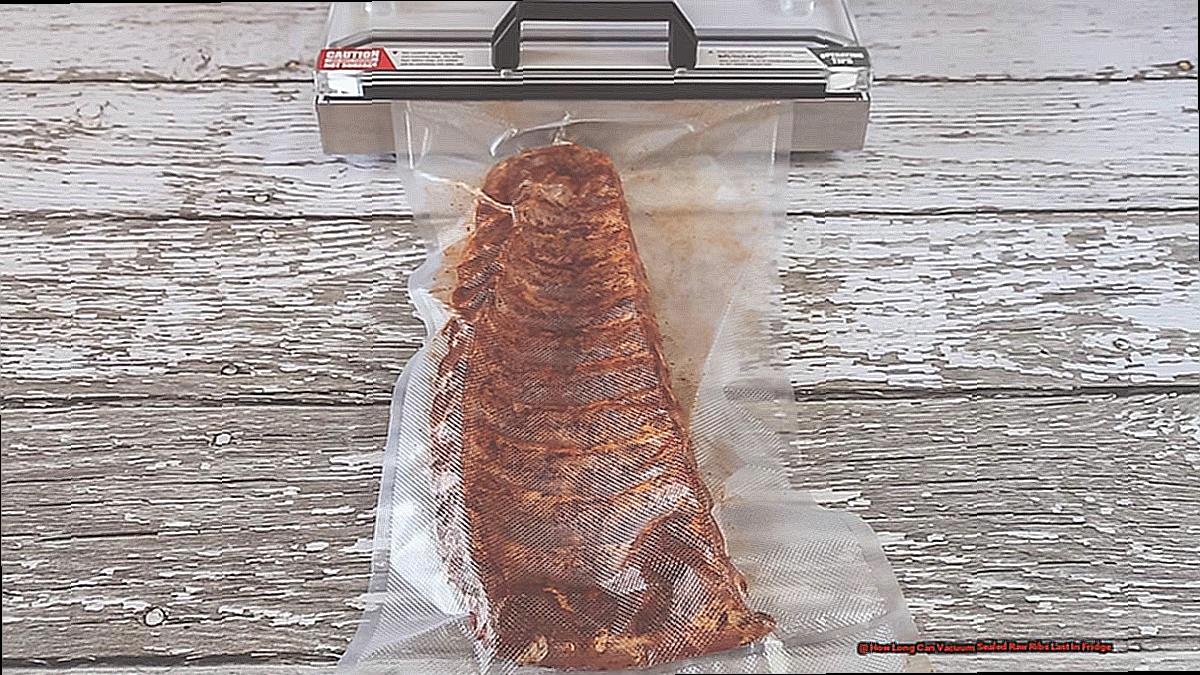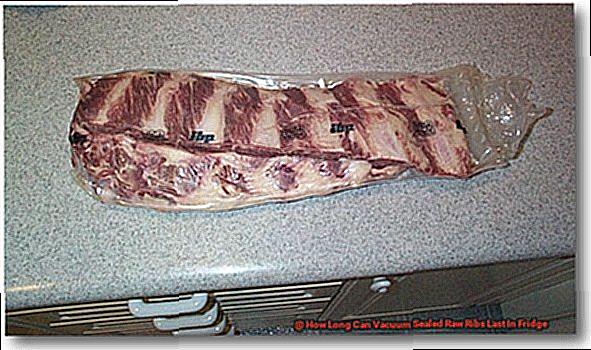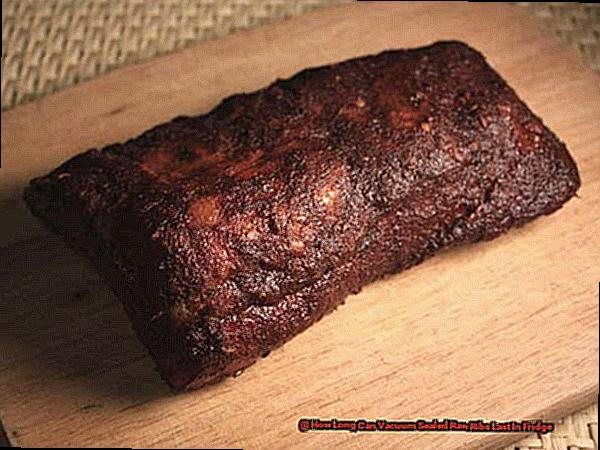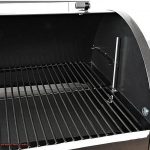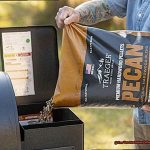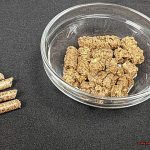Do you crave the succulent taste of BBQ ribs but struggle with keeping them fresh in the fridge? Look no further, because we have all the juicy details on how to maintain the freshness of your vacuum-sealed raw ribs. In this blog post, we’ll be delving into the shelf life of these delicious cuts of meat and sharing some helpful tips along the way. So get ready to learn:
• The advantages of vacuum sealing your raw ribs
• How long you can expect your vacuum-sealed ribs to last in the fridge
• Essential techniques for properly storing and handling these sealed beauties
• Warning signs that your ribs may have gone bad
Contents
• Creative recipe ideas for using up any leftover vacuum-sealed ribs
Whether you’re planning a backyard BBQ or simply want to stock up on some mouthwatering ribs, understanding their shelf life is crucial. So sit back, relax, and let’s explore everything there is to know about vacuum-sealed raw ribs.
How Long Do Ribs Last in the Fridge?
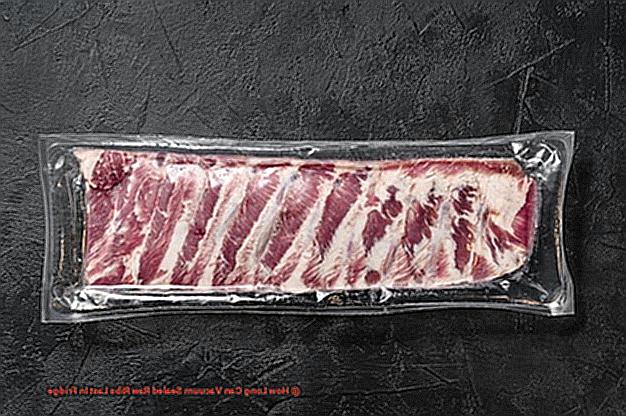
Vacuum sealing is an excellent way to prolong the lifespan of raw ribs in the refrigerator. With proper sealing and refrigeration, raw ribs can last for up to three weeks, significantly longer than their usual shelf life of one to two weeks when stored without vacuum sealing. Here is a table summarizing the shelf life of vacuum-sealed ribs in the fridge:
| Type of Ribs | Storage Time in Fridge | Storage Time in Freezer |
|---|---|---|
| Raw Pork Ribs | Up to 3 weeks | Up to 6 months |
| Cooked Pork Ribs | Up to 2 weeks | Up to 6 months |
| Smoked Ribs | Up to 3-4 days | Up to 2-6 months |
| Cooked Beef and Veal Ribs | Up to 6 weeks | Up to 9 months |
| Cooked Poultry and Fish Ribs | Up to 1 week | Up to 6 months |
Vacuum sealing eliminates exposure to air, which stimulates bacterial growth and diminishes the quality of meat. It also helps retain moisture, preventing the meat from becoming dry and tough. This is essential for ribs, renowned for their tenderness when cooked correctly.
To ensure optimal preservation, it is crucial to store vacuum-sealed ribs in the fridge at or below 40°F. Additionally, it is recommended to store the ribs on a shelf rather than in the fridge door, as the door may experience temperature fluctuations.
It is important to note that vacuum sealing does not entirely eradicate the risk of spoilage or food poisoning. Therefore, it is still essential to follow proper food handling practices, including avoiding cross-contamination and washing thermometers. It is also best to place smoked ribs in the fridge within two hours of removing them from the smoker and dividing them into smaller portions before storing.
In summary, vacuum-sealed raw ribs can last up to three weeks in the fridge before needing to be cooked or discarded. This extended shelf life makes it a great option for meal prep or storing ribs for future use.
How Long Do Cooked Ribs Last in the Fridge?
According to the US Department of Agriculture (USDA), it is crucial to consume or store cooked ribs within four days of cooking to ensure food safety and prevent the risk of foodborne illness. However, the shelf life of cooked ribs in the fridge can be affected by various factors, such as storage conditions and method.
The following table summarizes the recommended storage time for cooked ribs based on different storage methods:
| Storage Method | Recommended Storage Time | Factors that Affect Shelf Life |
| Vacuum Sealed | Up to 3 weeks | Prevents exposure to oxygen, which can lead to spoilage. |
| Refrigerator in a Container or Wrapped in Foil | 4 days | Properly sealed containers or foil can help maintain moisture and prevent cross-contamination. |
| Refrigerator in a Plastic Bag | 2-3 days | Plastic bags do not provide as much protection against oxygen and can lead to faster spoilage. |
It is important to keep in mind that these recommended storage times only apply to ribs that have been properly cooled down and stored at or below 40°F within two hours after cooking. If your ribs have been left at room temperature for more than two hours, it is best to discard them.
Furthermore, even if cooked ribs are still safe to eat, their quality may start to deteriorate after a few days in the fridge. For optimal flavor and texture, it is recommended to consume cooked ribs within 2-3 days.
In conclusion, it is highly advised to consume or store cooked ribs within four days of cooking to ensure food safety. While proper storage methods, such as vacuum sealing, can extend the shelf life of cooked ribs, it is important to note that their quality may still decline after a few days.
How Long Do Raw Ribs Last in the Fridge?
When raw ribs are properly vacuum sealed and stored in the refrigerator, they can last for up to 10 days. However, it is important to keep in mind that the shelf life of vacuum-sealed meats depends on several factors, such as the type of meat, storage temperature, and packaging methods.
Vacuum sealing is a process where air is removed from the packaging before sealing, creating an airtight environment that prevents exposure to air and slows down the growth of bacteria. This results in a longer shelf life compared to non-vacuum sealed meats.
The following table compares the estimated shelf life of different types of raw meats when vacuum sealed and stored in the fridge:
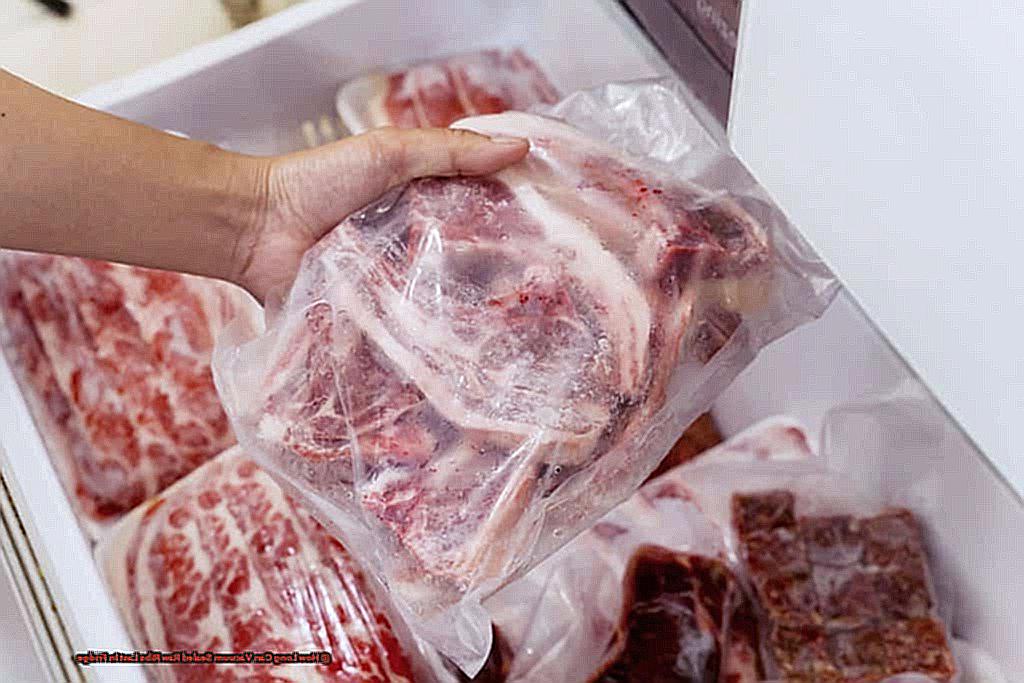
| Meat Type | Raw Vacuum-Sealed Shelf Life (Fridge) |
| Pork Ribs | Up to 10 days |
| Beef/Veal | Up to 6 weeks |
| Poultry/Fish | Up to 1 week |
It is important to note that while vacuum sealing can extend the shelf life of raw ribs, it does not make them completely impervious to spoilage. Proper food handling and storage practices are still crucial in maintaining the freshness and quality of the meat. This includes storing the ribs at a temperature of 40°F or lower and checking for any signs of spoilage before consuming.
Furthermore, cooked ribs that have been vacuum sealed have a shorter shelf life compared to raw ribs. It is recommended to consume cooked vacuum-sealed ribs within 3 days for optimal freshness and safety.
When properly stored and refrigerated at the correct temperature, vacuum-sealed raw ribs can last up to 10 days. However, it is always best to follow proper food safety guidelines and consume the ribs within a shorter time frame for optimal freshness and taste.
How Long Do Cooked Ribs Last in the Freezer?
When it comes to storing cooked ribs in the freezer, there are a few things to keep in mind. First, if you vacuum seal your ribs before freezing, they can last up to 3-4 months. However, if you didn’t vacuum seal them, it’s best to consume them within 1-2 months for optimal quality and safety. It’s crucial to ensure that the ribs are fully cooked before freezing them and to label and date them accurately for future reference.
Properly storing cooked ribs can save you time and money in the long run, as you can easily reheat them for a quick and delicious meal. However, it’s important to understand the best way to store them in order to maintain their quality and safety.
One option is to vacuum seal the ribs before freezing them. This will help preserve their freshness and taste for up to 3-4 months. However, if you don’t have a vacuum sealer, you can still freeze your ribs without sacrificing too much quality. In this case, it’s recommended to consume them within 1-2 months for the best taste and texture.
Before freezing your cooked ribs, it’s essential to make sure they are fully cooked. This ensures that any potential bacteria or harmful microorganisms are eliminated before freezing. Additionally, be sure to properly label and date your ribs so that you can easily identify them and keep track of how long they have been frozen.
How Long Do Raw Ribs Last in the Freezer?
When it comes to storing raw ribs in the freezer, proper storage is key. When vacuum sealed and kept at a temperature of 0°F or below, raw ribs can last up to 2 years. This is a considerable amount of time, allowing you to keep your ribs fresh and ready for cooking whenever you desire.
But why would you want to keep raw ribs in the freezer for that long? Well, as any experienced cook knows, having frozen meat on hand can be a game-changer. It allows you to be more spontaneous with your meals and saves you from having to make frequent trips to the grocery store.
However, it’s essential to ensure that you are storing your ribs correctly. Vacuum sealing is an effective method for preserving food and preventing freezer burn. The ribs should also be kept at a temperature of 0°F or below to maintain their quality.
To put it simply, the better you store your raw ribs, the longer they will last in the freezer. So, don’t be afraid to stock up on ribs when they’re on sale or when you have leftovers from a BBQ party. With proper storage techniques, you can enjoy delicious ribs for up to 2 years.
In conclusion, vacuum sealed raw ribs can last up to 2 years in the freezer if properly stored at 0°F or below. So go ahead and take advantage of this convenient and practical way of preserving meat.
How to Avoid Ribs From Spoiling?
Vacuum sealing is an exceptional technique for preserving ribs in the fridge. It eliminates oxygen and slows down decay. However, proper storage and handling are key in preventing spoilage. Here are the top storage methods to avoid ribs from spoiling in the fridge, specifically when using vacuum sealing.
Maintain a temperature below 40°F
To prevent bacterial growth, ribs must be stored at a constant temperature below 40°F. Typically, the bottom shelf of the fridge is the coldest area, making it the ideal spot for storing ribs.
Wrap before storing
Before vacuum sealing your ribs, wrap them in aluminum foil or plastic wrap to avoid moisture loss and freezer burn.
Utilize vacuum sealing
Vacuum sealing removes oxygen and slows down decay, prolonging the shelf life of ribs in the fridge from 3-4 days to 6-10 days.
Store in an airtight container
If a vacuum sealer is not available, store ribs in an airtight container to prevent air exposure.
Monitor for signs of spoilage
Keep a lookout for mold, changes in color or texture, and a slimy or gooey appearance. These are indications of spoilage and should not be consumed.
Reheat properly
When reheating leftover ribs from the fridge, grilling is recommended over smoking to prevent them from drying out. Thawed ribs should be cooked immediately or stored for no more than 3-5 days in an airtight container.
By following these storage methods, you can ensure that your ribs remain fresh and safe to consume for extended periods. Always prioritize food safety and proper handling when storing and preparing meat.
How To Determine if Ribs are Spoiled?
There are various methods for detecting if vacuum-sealed raw ribs have spoiled. These include the smell test, color test, firmness test, and mold test. It’s important to note that vacuum-sealed meat may have a slightly different odor, but this will dissipate after rinsing with cold water. The following chart summarizes how to determine if ribs have gone bad:
| Test | How to Conduct | Signs of Spoilage |
| Smell test | Take a whiff of the ribs for any unpleasant or foul smell. | Off-putting smell similar to ammonia or sulfur. |
| Color test | Inspect the color of the ribs. | Discolored appearance, such as gray or greenish shades. |
| Firmness test | Press your finger into the ribs. | Slimy or inconsistent texture. |
| Mold test | Look for any mold growth on the ribs. | Mold growth is a sign of spoilage and should be avoided. |
In addition to these tests, there are other indicators of spoilage, such as an expired expiration date or improper storage. It’s crucial to check the expiration date on store-bought ribs before purchasing or consuming them. Proper storage is also essential in preventing spoilage. Raw ribs should be kept in a cold environment below 40 degrees F and cooked within two hours if left at room temperature.
Moreover, it’s important to thaw meat properly before cooking. Thawing can be done in the refrigerator, microwave, or cold water. Once thawed, the meat can’t be refrozen. Leftover cooked ribs can be stored in the fridge for up to four days or in the freezer for up to three months if stored correctly.
For optimal taste and safety, it’s recommended to consume leftover ribs within three days. Practicing proper food handling techniques, such as avoiding cross-contamination and sanitizing thermometers, can also aid in preventing spoilage and food poisoning.
Conclusion
In conclusion, vacuum-sealed raw ribs are a game-changer when it comes to preserving the freshness and flavor of your BBQ ribs.
With proper sealing and refrigeration, these succulent cuts can last up to three weeks in the fridge – a significant improvement from their usual shelf life of only one to two weeks. The vacuum sealing process also helps lock in moisture, preventing the meat from drying out and becoming tough.
However, it is crucial to handle and store these sealed gems with care to avoid spoilage or food poisoning. By following our tips on storage and handling, such as maintaining a consistent temperature below 40°F and keeping an eye out for any signs of spoilage, you can indulge in delicious ribs for extended periods without worry.
So whether you’re planning a backyard BBQ or stocking up on some mouthwatering ribs, vacuum sealing is the ultimate solution for optimal preservation and taste.

